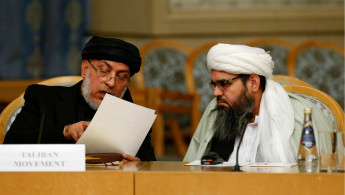Moscow hosts Afghan, Taliban delegates for peace talks
Russian Foreign Minister Sergei Lavrov said that the participation of both Afghan leaders and the Taliban was an "important contribution" aimed at creating "favourable conditions for the start of direct talks".
Taliban spokesman Zabiullah Mujahid said the conference was "not about holding negotiations with any party whatsoever - rather it is about finding a peaceful solution to the issue of Afghanistan".
This is the first time that a Taliban delegation is taking part in such a high-level international meeting, Russian foreign ministry spokeswoman Maria Zakharova said Thursday.
The Taliban is banned from operating in Russia as it is classified as a "terrorist organisation".
The Moscow conference also comes nearly three decades after Russia ended its 10-year-long occupation of Afghanistan in disgrace.
Friday's Afghan delegation is made up of four representatives of the High Peace Council, a government body responsible for reconciliation efforts with the militants, spokesman Sayed Ihsan Taheri said.
Twitter Post
|
The Afghan foreign ministry has emphasised that the council does not represent the Afghan government at the meeting, however.
Moscow said it had invited representatives from the US as well as India, Iran, China, Pakistan and five former Soviet republics in Central Asia.
Pakistan, which has long been accused of providing support to the Afghan Taliban, would "definitely" attend, foreign ministry spokesman Muhammad Faisal told AFP.
The US embassy in Moscow was sending a representative to observe the discussions.
The Moscow meeting was initially scheduled to take place in September but was postponed after Kabul insisted that the process should be Afghan-led.
The meeting comes at a sensitive time.
Newly appointed US peace envoy Zalmay Khalilzad has been trying to convince the Taliban to agree to negotiate an end to the war and there are fears the Russian meeting could derail those efforts.
A US government watchdog last week said Kabul's control of Afghanistan had slipped in recent months as local security forces suffered record casualties while making minimal or no progress against the Taliban.
It also said that the Taliban controls more territory now than at any point since the US-led NATO war began in 2001.
This year broadly has also proved to be the deadliest for Afghans. Suicide bombs caused more than 2,300 civilian casualties so far, more than any other tactic, including ground fighting, according to a recent UN report.
Follow us on Twitter: @The_NewArab





 Follow the Middle East's top stories in English at The New Arab on Google News
Follow the Middle East's top stories in English at The New Arab on Google News
![Israeli forces ordered bombed Gaza's Jabalia, ordering residents to leave [Getty]](/sites/default/files/styles/image_330x185/public/2176418030.jpeg?h=a5f2f23a&itok=_YGZaP1z)

